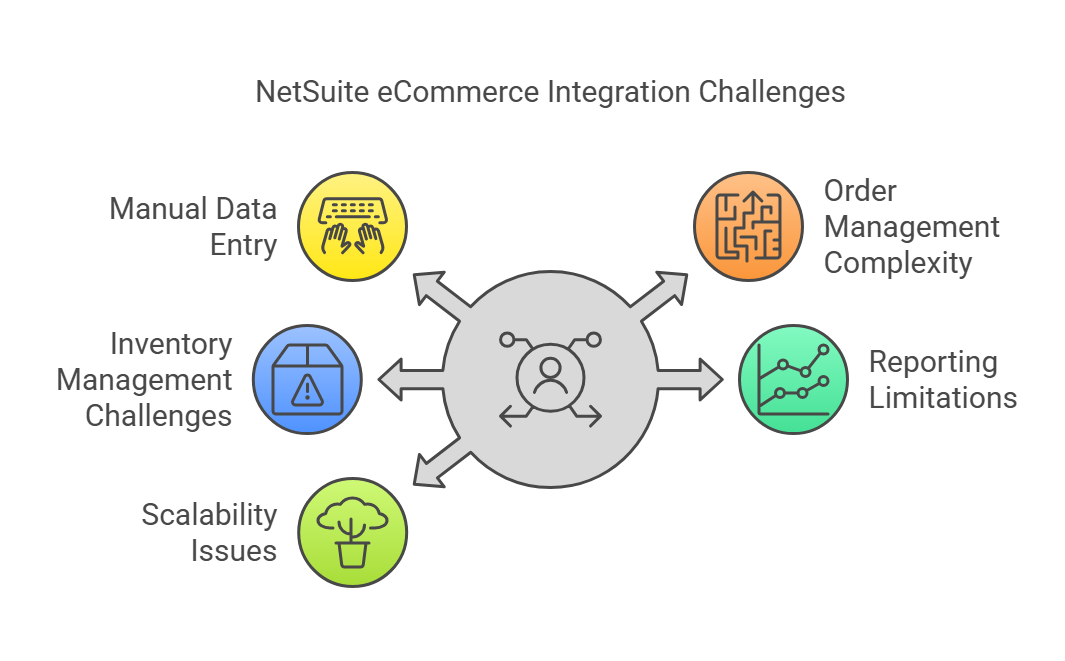
In today’s hyper-competitive eCommerce landscape, delivering an exceptional customer experience is no longer a luxury—it’s a necessity. Customers expect personalized interactions, real-time updates, and seamless transactions. For businesses using Infor ERP systems, integrating Infor eCommerce capabilities can be a game-changer.
This blog will explore how Infor eCommerce integration can enhance your business by addressing key pain points like order management challenges and lack of personalization, while also diving into how integrating Infor with leading eCommerce platforms like Adobe Commerce, Magento Open Source, BigCommerce, and Shopify Plus can unlock new levels of customer satisfaction and operational efficiency.
In this blog, we’ll explore-
- The eCommerce Pain Points: Why NetSuite eCommerce Integration Matters
- When NetSuite eCommerce Integration Isn’t Enough: Is it Time for Re-platforming
- How Our NetSuite Integrations with Adobe Commerce & BigCommerce Have Helped Businesses Grow
- The ROI of NetSuite eCommerce Integration
- Is Your Current Platform Holding You Back?
- Why Partner with DotcomWeavers for NetSuite eCommerce Integration?
- Optimize Your eCommerce with Seamless NetSuite Integration
Let’s dive deeper into every aspect to give you a complete picture.
The eCommerce Pain Points: Why NetSuite eCommerce Integration Matters

eCommerce businesses face a unique set of challenges as they scale. Here are some of the most common pain points that NetSuite eCommerce integration can help address:
1. Manual Data Entry and Disconnected Systems
Many eCommerce businesses rely on manual data entry to transfer information between their eCommerce platform and NetSuite. This not only consumes valuable time but also increases the risk of errors, leading to order discrepancies, inventory inaccuracies, and financial mismanagement.
How NetSuite Integration Helps: A seamless NetSuite eCommerce integration automates data flow between your eCommerce platform and NetSuite. Orders, customer information, inventory updates, and financial data are synchronized in real-time, eliminating the need for manual entry and reducing errors.
2. Order Management Complexity
As businesses expand their sales channels (online stores, marketplaces, B2B portals, etc.), managing orders becomes increasingly complex. Disconnected systems can lead to delayed fulfillment, overselling, and poor customer experiences.
How NetSuite Integration Helps: NetSuite eCommerce integration centralizes order management. Whether an order comes from your website, Amazon, or a B2B portal, it flows directly into NetSuite, where it can be processed, fulfilled, and tracked—all from a single system.
3. Inventory Management Challenges
Inventory management is a critical yet challenging aspect of eCommerce. Without real-time visibility, businesses risk overstocking, stockouts, and inaccurate demand forecasting.
How NetSuite Integration Helps: With NetSuite eCommerce integration, you gain real-time inventory visibility across all sales channels and warehouses. This ensures accurate stock levels, reduces carrying costs, and improves order fulfillment rates.
4. Reporting and Analytics Limitations
Many eCommerce businesses struggle to generate actionable insights due to fragmented data across multiple systems. This makes it difficult to track performance, identify trends, and make data-driven decisions.
How NetSuite Integration Helps: NetSuite eCommerce integration consolidates data from your eCommerce platform, ERP, and other systems into a single source of truth. This enables comprehensive reporting and analytics, giving you the insights needed to optimize operations and drive growth.
5. Scalability Issues
As your business grows, your eCommerce platform must be able to handle increased traffic, larger product catalogs, and more complex operations. Platforms that work well for small businesses may struggle to meet the demands of a growing enterprise.
How NetSuite Integration Helps: NetSuite is designed to scale with your business. When integrated with a robust eCommerce platform, it can handle higher transaction volumes, larger SKU counts, and more complex workflows, ensuring that your operations remain efficient as you grow.
When NetSuite eCommerce Integration Isn’t Enough: Is it Time for Re-platforming

While NetSuite eCommerce integration can solve many operational challenges, there are scenarios where businesses may still face inefficiencies. These issues often stem from limitations in the eCommerce platform itself, rather than NetSuite.
Here are some common signs that it might be time to consider re-platforming:
1. Platform Limitations with SKU Count
If your business has a large and growing SKU count, some eCommerce platforms may struggle to handle the complexity. For example, Shopify (even with NetSuite integration) may not be ideal for businesses with tens of thousands of SKUs.
- Solution: Re-platform to a more scalable solution like Adobe Commerce or BigCommerce, which are designed to handle large product catalogs and complex inventory management.
2. Poor Integration Capabilities
Not all eCommerce platforms integrate seamlessly with NetSuite. If you’re experiencing frequent sync issues, data discrepancies, or limited functionality, it may be due to poor integration capabilities.
- Solution: Choose an eCommerce platform with robust native integration options for NetSuite, such as BigCommerce or Shopify Plus, or consider custom integration services to bridge the gap.
3. Inflexible Workflows
Some eCommerce platforms have rigid workflows that don’t align with your business processes. This can lead to inefficiencies, especially if you’re operating in a niche market or have unique requirements.
- Solution: Platforms like Adobe Commerce offer highly customizable workflows, allowing you to tailor the system to your specific needs while maintaining seamless integration with NetSuite.
4. Limited Omnichannel Capabilities
If you’re selling across multiple channels (e.g., online store, marketplaces, social media), your eCommerce platform must support omnichannel operations. Some platforms may lack the necessary features, leading to fragmented operations.
- Solution: Re-platform to an omnichannel-ready solution like BigCommerce or Shopify Plus, which offer built-in tools for managing multiple sales channels while integrating seamlessly with NetSuite.
5. Performance and Scalability Issues
As your business grows, you may encounter performance issues such as slow page load times, checkout delays, or system crashes during peak traffic. These issues can harm your customer experience and revenue.
- Solution: Upgrade to a more robust platform like Adobe Commerce or BigCommerce, which are designed to handle high traffic volumes and complex operations without compromising performance.
How Our NetSuite Integrations with Adobe Commerce & BigCommerce Have Helped Businesses Grow
DotcomWeavers as a leading Digital Commerce agency specializing in NetSuite integrations with Adobe Commerce and BigCommerce, we’ve helped businesses streamline operations, enhance user experience, and scale efficiently. Our tailored solutions bridge the gap between eCommerce platforms and ERP systems, ensuring seamless data flow, automation, and improved performance.
Below are a few success stories showcasing the impact of our expertise:
Riverside Furniture – Adobe Commerce & NetSuite Integration

Challenge: Outdated eCommerce, limited B2B portal, inefficient inventory management.
Solution: Migrated to Adobe Commerce, integrated NetSuite ERP & Akeneo PIM for:
- Scalable architecture
- Automated inventory & orders
- Custom B2B portal
- Enhanced UX
Results:
- Real-time inventory & order management
- Improved dealer engagement & sales
- Faster site speed & personalization
IncStores – Unified eCommerce with Adobe Commerce

Challenge: Five disjointed websites, poor UX, manual order processing.
Solution: Consolidated into Adobe Commerce, integrated NetSuite ERP & Akeneo PIM with:
- Unified platform
- Automated operations
- Faster Hyva theme
- DIY Designer Tool
Results:
- Higher conversions & faster checkout
- Real-time inventory updates
- Increased engagement via customization
The ROI of NetSuite eCommerce Integration
When done right, integrating NetSuite with your eCommerce platform does more than just streamline operations—it drives measurable cost savings, increases efficiency, and accelerates growth. However, achieving maximum ROI depends on choosing an eCommerce platform that complements NetSuite’s capabilities. If your current platform creates bottlenecks, re-platforming or investing in managed support may be the key to unlocking NetSuite’s full potential.
1. End-to-End Automation: Reduce Labor Costs & Boost Productivity
By automating everything from order capture to fulfillment, NetSuite integration cuts down on manual processes, reducing labor costs and minimizing errors. With fewer repetitive tasks, your team can focus on high-value activities like sales, customer experience, and strategic growth.
2. Real-Time Data Synchronization: Prevent Revenue Loss from Stockouts & Over-Selling
Accurate, bi-directional data flow ensures that inventory levels, orders, and customer details stay updated across all sales channels. This prevents costly stockouts, overselling, and order errors—improving fulfillment efficiency while reducing lost revenue due to mismanaged inventory.
3. Improved Customer Experience: Increase Retention & Lifetime Value
Faster order processing, real-time inventory visibility, and seamless omnichannel shopping create a frictionless customer journey. Happy customers mean higher retention rates, increased repeat purchases, and stronger brand loyalty—all translating to higher customer lifetime value (CLV).
4. Advanced Financial Management: Reduce Compliance Risks & Manual Accounting Costs
NetSuite centralizes financial data across multiple sales channels, automating invoicing, tax calculations, and revenue recognition. This reduces the need for manual reconciliation, lowers accounting overhead, and ensures compliance—saving both time and potential penalty costs.
5. Scalable Infrastructure: Support High Growth Without Increasing Overhead
A well-integrated NetSuite system supports high SKU counts, multi-channel sales, and complex workflows without requiring a proportional increase in staff or IT resources. However, if your current eCommerce platform limits scalability, re-platforming to Adobe Commerce, BigCommerce, or Shopify Plus can eliminate bottlenecks and future-proof your growth.
6. Omnichannel Operations: Maximize Sales & Reduce Operational Silos
By unifying online stores, B2B portals, marketplaces, and retail locations into one system, NetSuite integration enables centralized order management, personalized marketing, and flexible fulfillment—leading to increased sales while reducing the inefficiencies of siloed operations.
7. Lower IT Costs & Maintenance: Free Up Internal Resources
With seamless integration, businesses spend less time and money on IT troubleshooting, patching, and system workarounds. Managed support services further optimize performance, enhance security, and ensure smooth platform upgrades—reducing the need for costly in-house IT support.
8. Data-Driven Decision Making: Optimize Pricing, Inventory, & Demand Planning
Real-time analytics empower businesses to make smarter decisions based on actual sales trends and customer behavior. Improved forecasting helps reduce excess inventory, optimize pricing strategies, and increase margins—directly impacting profitability.
Is Your Current Platform Holding You Back?
While NetSuite integration is a powerful tool, its benefits are only fully realized with the right eCommerce platform. If your current system is outdated, inefficient, or unable to scale, you could be leaving money on the table. Re-platforming to a solution like Adobe Commerce or BigCommerce ensures that your investment in NetSuite translates into tangible ROI—through increased efficiency, cost savings, and revenue growth.
Why Partner with DotcomWeavers for NetSuite eCommerce Integration?

While NetSuite eCommerce integration offers immense potential, achieving optimal results requires expertise. Here’s how partnering with an experienced team can help:
- Technical Audit and Analysis: A thorough audit of your current systems can identify inefficiencies and areas for improvement. This ensures that your integration is tailored to your specific needs.
- Re-Platforming Services: If your current eCommerce platform is holding you back, experts can guide you through the process of re-platforming to a more scalable solution like Adobe Commerce, BigCommerce, or Shopify Plus.
- Managed Support Services: Ongoing support ensures that your integration continues to perform optimally as your business evolves.
- Custom Integration Solutions: For businesses with unique requirements, custom integration services can bridge the gap between your eCommerce platform and NetSuite.
Optimize Your eCommerce with Seamless NetSuite Integration
NetSuite eCommerce integration is a powerful tool for streamlining operations, reducing inefficiencies, and driving growth. However, the success of your integration depends on choosing the right eCommerce platform and implementing it correctly. If your current setup is holding you back, it may be time to consider re-platforming to a more scalable solution like Adobe Commerce, BigCommerce, or Shopify Plus.
By partnering with experts who specialize in NetSuite eCommerce integration, you can unlock the full potential of your systems and position your business for long-term success. Whether you need a technical audit, re-platforming services, or ongoing support, the right team can help you achieve your goals and take your eCommerce operations to the next level.
If you wish to contact us, you may send us an email at insights@dotcomweavers.com.
Receive a Personalized Consultation for Your eCommerce Requirements!
Receive a Personalized Consultation for Your eCommerce Requirements!
